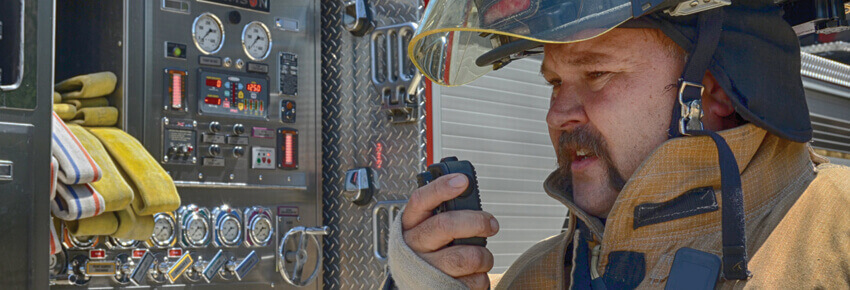
First responders need reliable communication with dispatch and each other. Whether it’s handling a traffic stop, working inside a building, or managing an incident, they need peace of mind — the assurance that their communications aren’t impacted by lack of coverage. In networks designed for mobile coverage, working inside buildings or over rough terrain makes communication challenging for portable users.
EFJohnson Technologies, Inc. (EFJohnson) has collaborated with Pyramid Communications (Pyramid) to develop an Enhanced Vehicular Repeater Solution (EVRS) that improves the portable user experience for first responders while providing extended coverage.
Supported by this solution:
- P25 Voice Call
- Talk Permit Tone
- Busy Indication
- Deny Indication
- Emergency Notification
- Out of Range Indication
- Priority Vehicle Assignment
How a Typical Digital Vehicular Repeater System Works

The above figure shows a typical Digital Vehicular Repeater System (DVRS) configuration. The portable radio communicates with the DVR over simplex conventional. The DVR then connects to the mobile radio to communicate with dispatch through a trunked system, effectively providing a coverage extender for the portable radio.
Challenges with the Basic DVRS Implementation
While the typical DVRS provides coverage extension to portable radios, it effectively turns the trunked system into a conventional system for portable users. It does not provide the P25 trunked experience to portable users.
- Portable users don’t receive confirmation that their Push-to-Talk (PTT) transmission was successful:
- Users aren’t notified of channel allocation during PTT.
- Users aren’t notified that the trunked system was busy during PTT.
- Users aren’t notified if the trunked system denied their PTT request for any reason.
- If the portable user places an emergency call, such emergency condition is not propagated to the dispatcher.
- If the mobile is out of range of the trunked system or the portable is out of range of the DVR, the portable user is not notified.
KENWOOD Viking-Pyramid EVRS
KENWOOD Viking-Pyramid Enhanced Vehicular Repeater Solution
KENWOOD Viking and Pyramid have developed an Enhanced Vehicular Repeater Solution (EVRS). EVRS solves portable user challenges with typical DVRS implementation by providing an enhanced trunked experience using a DVR.

Talk Permit Tone
When a KENWOOD Viking® portable user presses PTT, the portable sends a request to the Pyramid SVR-P255 to set up a call on the trunked system. The SVR-P255 communicates with the KENWOOD Viking mobile radio and places a call on the trunked system. When the trunked system responds to the call request, the SVR-P255 contacts the portable, indicating that the system has allocated a traffic channel for this communication. At this point, the portable user receives a talk permit tone and can communicate with the dispatcher and other portable users.
Busy Indication
When a Viking portable user presses PTT, the portable sends a request to the SVR-P255 to set up a call on the trunked system. The SVR-P255 communicates with the mobile radio and places a call on the trunked system. If the trunked system cannot allocate a traffic channel and sends a busy notification to the mobile, the SVR-P255 then sends the busy notification to the portable. The portable provides both an audible and visual notification of the busy channel.
Deny Indication
When a Viking portable user presses PTT, the portable sends a request to the SVR-P255 to set up a call on the trunked system. The SVR-P255 communicates with the Viking mobile radio and places a call on the trunked system. If the trunked system denies the call for any reason (e.g., a busy timeout), the SVR-P255 sends the deny notification to the portable; the portable then provides both an audible and visual notification to the user indicating the call has been denied.
Emergency Notification
When a Viking portable user presses emergency and places a call (via hot mic or PTT), the portable sends an emergency call request to the SVR-P255 to set up a call on the trunked system. The SVR-P255 communicates with the Viking mobile radio and sets up an emergency call on the trunked system. When the call is set up, the dispatcher receives an emergency indication.
Out of Range Notification
The KENWOOD Viking-Pyramid EVRS provides two types of out of range notification:
- If the Viking mobile radio is out of range of the trunked system, the SVR-P255 notifies all connected Viking portables that the portables will not be able to communicate with the trunked system. However, the portables can continue to communicate with the SVR-P255 and other portables in the vicinity.
- The SVR-P255 sends out a periodic message indicating the portables are within range. If a portable user goes out of range (e.g., enters a building), the portable provides both an audible and visible notification, indicating the user is out of range of the SVR-P255 and will not be able to communicate.
Priority Vehicle Assignment
The SVR-P255 also utilizes Pyramid's latest ESP™ priority structure that establishes a priority vehicle to handle traffic on the scene. With Pyramid’s P25 ESP protocol, priority vehicles are assigned with little user intervention to ensure uninterrupted communications when users exit their vehicles. ESP also ensures a quick recovery if two vehicles get in a priority mode at one scene.
Ordering Information
The EVRS feature is available on all KENWOOD Viking P25 portable and mobile radios including: VP6000, VP5000, VP900, VP600, VM7000, VM6000, VM5000, and VM900. To order this feature, please select the Enhanced VRS software option when ordering the any mobile or portable.
White Papers
